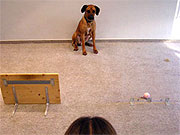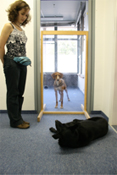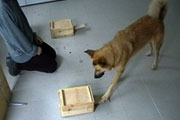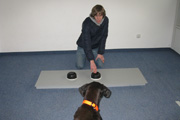Please notice
Currently there is no research with dogs in our department. The text on this webpage refers to past studies and will stay online for your information only.
Research with dogs

One aim of the Department of Comparative and Developmental Psychology is to investigate the evolution of different cognitive processes. The comparative approach includes the study of a variety of animal species. Although most of our work is done with the great apes, we also investigate other species such as goats, seals, and dogs. For a number of reasons, the domestic dog (Canis familiaris) is a very interesting model for investigating different questions regarding the evolution of cognitive abilities. The fact that dogs have been living with humans for at least 15.000 years may have led to the selection of cognitive abilities by humans or even the co-evolution of dogs’ cognitive abilities with those of humans. We know from different studies that dogs are sensitive to the attentional state of humans. We also know that dogs understand communicative cues. This ability has not been found in nonhuman primates and wolves.
Our research with dogs focuses on the following topics:
Human-dog communication
The main question is how flexible dogs' understanding of human communication is. In a typical set-up we hide food from a dog in one of several containers and then indicate to the dog where the food is by using a cue (e.g. a pointing gesture). Dogs are more skillful in making use of human pointing gestures than wolves and even chimpanzees are. We now investigate how dogs perceive such gestures and if they understand their referential nature.
In addition, we are interested in dogs' ability to comprehend other forms of human communication including object labels and non-linguistic gestures such as symbolic and other non-directional representations.
Suggested readings
Tempelmann, S., Kaminski, J., & Tomasello, M. (2014). Do domestic dogs learn words based on humans’ referential behaviour? PLoS One, 9(3): e91014. |
|
Rossano, F., Nitzschner, M., & Tomasello, M. (2014). Domestic dogs and puppies can use human voice direction referentially. Proceedings of the Royal Society B: Biological Sciences, 281(1785): 20133201. |
Kaminski, J., & Nitzschner, M. (2013). Do dogs get the point? A review of dog–human communication ability. Learning and Motivation, 44(4), 294-302. |
|
Scheider, L., Kaminski, J., Call, J., & Tomasello, M. (2013). Do domestic dogs interpret pointing as a command? Animal Cognition, 16(3), 361-372. |
Kaminski, J., Schulz, L., & Tomasello, M. (2012). How dogs know when communication is intended for them. Developmental Science, 15(2), 222-232. |
|
Grassmann, S., Kaminski, J., & Tomasello, M. (2012). How two word-trained dogs integrate pointing and naming. Animal Cognition, 15(4), 657-665. |
Kaminski, J., Neumann, M., Bräuer, J., Call, J., & Tomasello, M. (2011). Dogs, Canis familiaris, communicate with humans to request but not to inform. Animal Behaviour, 82(4), 651-658. |
|
Pettersson, H., Kaminski, J., Herrmann, E., & Tomasello, M. (2011). Understanding of human communicative motives in domestic dogs. Applied Animal Behaviour Science, 133(3-4), 235-245. |
|
Scheider, L., Grassmann, S., Kaminski, J., & Tomasello, M. (2011). Domestic dogs use contextual information and tone of voice when following a human pointing gesture. PLoS ONE, 6(7): e21676. |
Hare, B., Rosati, A. G., Kaminski, J., Bräuer, J., Call, J., & Tomasello, M. (2010). The domestication hypothesis for dogs' skills with human communication: a response to Udell et al. (2008) and, Wynne et al. (2008). Animal Behaviour, 79(2), e1-e6. |
Kaminski, J., Tempelmann, S., Call, J., & Tomasello, M. (2009). Domestic dogs comprehend human communication with iconic signs. Developmental Science, 12(6), 831-837. |
Kaminski, J., Fischer, J., & Call, J. (2008). Prospective object search in dogs: mixed evidence for knowledge of What and Where. Animal Cognition, 11(2), 367-371. |
|
Riedel, J., Schumann, K., Kaminski, J., Call, J., & Tomasello, M. (2008). The early ontogeny of human – dog communication. Animal Behaviour, 75(3), 1003-1014. |
Hare, B., & Tomasello, M. (2005). Human-like social skills in dogs? Trends in Cognitive Sciences, 9(9), 439-444. |
Kaminski, J., Call, J., & Fischer, J. (2004). Word Learning in a Domestic Dog: Evidence for "Fast Mapping". Science, 304(5677), 1682-1683. |
Call, J., Bräuer, J., Kaminski, J., & Tomasello, M. (2003). Domestic dogs (Canis familiaris) are sensitive to the attentional state of humans. Journal of Comparative Psychology, 117(3), 257-263. |
Visual perspective taking

The main question is whether dogs are sensitive to what others can and cannot see. In our tests the dogs are able to see an object that the human - who is present - cannot see because the object is occluded by a barrier from the human’s view. We are interested whether dogs take advantage of this additional information. It turned out, for instance, that dogs eat forbidden food more frequently when the human cannot see them.
Suggested readings
Social learning

The main question is whether and how dogs learn from other dogs or humans. In our studies we allow dogs to observe other dogs or humans solving problems before they themselves are presented with the same problem.
Suggested readings
Nitzschner, M., Kaminski, J., Melis, A., & Tomasello, M. (2014). Side matters: potential mechanisms underlying dogs' performance in a social eavesdropping paradigm. Animal Behaviour, 90, 263-271. |
|
Hertel, A., Kaminski, J., & Tomasello, M. (2014). Generalize or personalize - do dogs transfer an acquired rule to novel situations and persons? PLoS One, 9(7): 10266. |
Nitzschner, M., Melis, A. P., Kaminski, J., & Tomasello, M. (2012). Dogs (Canis familiaris) Evaluate Humans on the Basis of Direct Experiences Only. PLoS One, 7(10): e46880. |
Kaminski, J., Nitzschner, M., Wobber, V., Tennie, C., Bräuer, J., Call, J., & Tomasello, M. (2011). Do dogs distinguish rational from irrational acts? Animal Behaviour, 81(1), 195-203. |
|
Mersmann, D., Tomasello, M., Call, J., Kaminski, J., & Taborsky, M. (2011). Simple Mechanisms Can Explain Social Learning in Domestic Dogs (Canis familiaris). Ethology, 117(8), 675-690. |
Tennie, C., Glabsch, E., Tempelmann, S., Bräuer, J., Kaminski, J., & Call, J. (2009). Dogs, Canis familiaris, fail to copy intransitive actions in third-party contextual imitation tasks. Animal Behaviour, 77(6), 1491-1499. |
Metacognitive abilities

The main question is whether dogs have access to their own perceptual and knowledge states. Here, the focus is not on what dogs understand about others, but on what dogs know about themselves. The question is, for example, whether they are aware of what they have seen in the past.
Suggested readings
Bräuer, J., Keckeisen, M., Pitsch, A., Kaminski, J., Call, J., & Tomasello, M. (2013). Domestic dogs conceal auditory but not visual information from others. Animal Cognition, 16(3), 351-359. |
Bräuer, J., & Call, J. (2011). The magic cup: great apes and domestic dogs (Canis familiaris) individuate objects according to their properties. Journal of Comparative Psychology, 125(3), 353-361. |
Bräuer, J., Call, J., & Tomasello, M. (2004). Visual perspective taking in dogs (Canis familiaris) in the presence of barriers. Applied Animal Behaviour Science, 88(3-4), 299-317. |
Physical Cognition

Our main question is how dogs perceive and understand the environment which surrounds them.
What do dogs know about physical relations, for instance about the fact that objects continue to exist after they have disappeared from the dog’s view? We are also interested in dogs’ understanding of causal relations. Can dogs use causal cues such as food in a cup producing a noise when it is shaken?
Suggested readings
Bräuer, J., & Call, J. (2011). The magic cup: great apes and domestic dogs (Canis familiaris) individuate objects according to their properties. Journal of Comparative Psychology, 125(3), 353-361. |
Rooijakkers, E. F., Kaminski, J., & Call, J. (2009). Comparing dogs and great apes in their ability to visually track object transpositions. Animal Cognition, 12(6), 789-796. |
Cooperation
In OUR studies concerning cooperation, we investigate whether dogs cooperate both with each other and with other species, such as humans. DO DOGS COORDINATE THOSE ACTIVITIES which THEY CANNOT DO ALONE? Are they aware of their partners' role during this process? IS THERE A MOTIVATION to help humans? Do they recognise, that the human needs help, to ACHIEVE A goal. In addition, we are interested how cooperation developed and changed during domestication. For this purpose we RUN comparative studies with the DOG' S ancestor, the wolf.
Dog research at the Max Planck Institute is strictly observational. There is no invasive research of any kind. We give the dogs various tasks to solve and observe how they interact with their environment, other dogs or a human. There is always a reward, usually a treat or a toy.
At the moment there is no dog research at the Max Planck Institute for Evolutionary Anthropology. For more information, please refer to Susanne Mauritz (0341/3550483 or mauritz@[>>> Please remove the text! <<<]eva.mpg.de).
A scientist formerly associated with the dog lab, Dr. Juliane Bräuer, has started a new dog lab in Jena. For more information, please refer to Juliane Bräuer (03641-686-935 or hundestudien@[>>> Please remove the text! <<<]shh.mpg.de).

 Open Access
Open Access